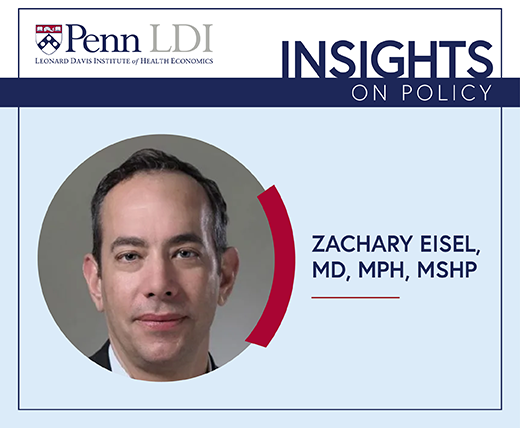
Estimated Overdose Deaths Due to the Loss of MOUD in the One Big Beautiful Bill Act
Research Memo: Delivered to House Speaker Mike Johnson and Majority Leader John Thune
Blog Post
Patients are “literally driving past a better hospital” when they need elective cancer surgery, said LDI Associate Fellow Caitlin Finn and LDI Senior Fellow Rachel Kelz in an interview on their new research. Even hospitals within miles of each other can provide a different quality of care, and their performance is often procedure-specific, meaning that a hospital with strong outcomes in one condition may have weak outcomes in another.
Unfortunately, such outcome and volume data are not often considered by doctors when they refer patients to a given hospital for care. Because of this, patients often end up at hospitals that are not the best-suited to their needs. Finn and Kelz found that around 60% of patients were not treated at the best hospital for their colorectal surgery procedure and would have been better served by another hospital within 30 miles of their home.
With this in mind, Finn, Kelz, and colleagues modeled how patient outcomes would have been different if patients had been treated at the best hospitals. They found substantial benefits, including a 26% relative decrease in mortality and an almost $2,000-per-patient increase in benefits to society. We asked them to expand on their study.
Patients may choose a hospital for many reasons, such as familiarity, insurance acceptance, shorter wait times, or even free parking. Other patients may follow the advice of their referring physicians, who may not have access to validated, objective information on hospital quality for a given surgery. In this study, we’re not able to see why patients chose lower-performing hospitals, but this is the subject of ongoing investigations.
We found that many hospitals performed colorectal cancer surgery with excellent outcomes. In our analysis, no single factor stood out as a hallmark of a high-performing hospital, but we were only able to capture superficial hospital characteristics, not detailed processes of care.
In general, we would characterize a high-performing hospital as a hospital with a proven track record of excellent risk-adjusted outcomes for their patient population.
In this study, we examined the value of the additional years of life that would have been gained by successful surgeries done at the highest-performing hospitals. There are also potential benefits to quality of life if patients are spared complications by receiving care from better hospitals.
There is a bigger financial burden associated with going to the highest-performing hospitals, since these hospitals were found to be slightly more expensive. There may also be increased travel costs, though most patients did not have to travel substantially farther to reach their best local hospital.
We think that the onus should be on both the patient and their physicians. Referring physicians should ensure that the surgeons they commonly recommend have the right training and experience to manage their patient’s needs. They should also verify that the patients treated by these surgeons typically experience good outcomes, ideally benchmarked to national data. Surgeons should be reflective and decide for each referred patient, “Am I the right surgeon for this patient? Does this patient’s situation require multidisciplinary input?”, or even, “Should I refer this patient to a colleague with expertise in the patient’s unique complex needs?”.
Patients should similarly vet their surgeons. They can do so by asking their surgeon how many times they perform a type of operation each year, what sorts of outcomes their patients experience, and how comfortable they are dealing with common complications of the procedure. We also encourage patients to get a second opinion if the surgeon does not answer their questions to their satisfaction.
One potential solution is the development of decision support tools, which are used commonly by physicians in other forms of clinical decision-making, such as medication selection. Decision support tools could incorporate both provider outcomes and patient characteristics to tailor recommendations to individual patients. We believe these tools would be particularly useful for referrals within health care systems, given that the hospital or system could leverage internal data to direct patients to the surgeon best suited to treat their individual needs.
Prior studies have shown that Black patients are more likely to use lower-quality hospitals for surgery. One proposed explanation is that physicians who commonly treat Black patients may not have access to as many high-quality specialists for referrals. However, in our study, we identified a higher-quality local hospital for similar proportions of Black and white patients. We were only able to include data from a single U.S. state, but further studies are currently underway to examine this question on a broader scale.
We recommend that policymakers consider developing procedure-specific markers of hospital quality that could be used by both patients and referring providers to guide their decision-making on surgical referrals. This would allow patients to weigh procedure-specific hospital quality against their other values when selecting a hospital, in contrast with the hospital quality information that is currently available to them, which is not procedure-specific and thus may have limited value.
We’re currently working on a nationwide study using Medicare data from patients with colorectal cancer to study the potential impact of data-driven referrals on racial and ethnic health disparities. We are also studying the impact of data-driven referrals on surgeons themselves. Given known disparities in referral volume and complexity to male versus female surgeons, we are investigating whether using objective performance data to guide surgical referrals may increase workforce equity. These studies will be used as a model to extend our work beyond colorectal cancer.
The study, “Comparison of Simulated Outcomes of Colorectal Cancer Surgery at the Highest-Performing vs. Chosen Local Hospitals,” was published on February 15, 2023 in JAMA Network Open. Authors include Caitlin Finn, Chris Wirtalla, Sanford Roberts, Karole Collier, Shivan Mehta, Carmen Guerra, Edoardo Airoldi, Xu Zhang, Luke Keele, Cary Aarons, Shane Jensen, and Rachel Kelz.


Research Memo: Delivered to House Speaker Mike Johnson and Majority Leader John Thune

Research Memo: Delivered to House Speaker Mike Johnson and Majority Leader John Thune

Historic Coverage Loss Could Cause Over 51,000 People to Lose Their Lives Each Year, New Analysis Finds
Research Brief: New Incentive Structures and Metrics May Improve Program Performance

Research Memo: Response to Request for Technical Assistance

Immigration Crackdown and Medicaid Cuts Put Millions at Risk